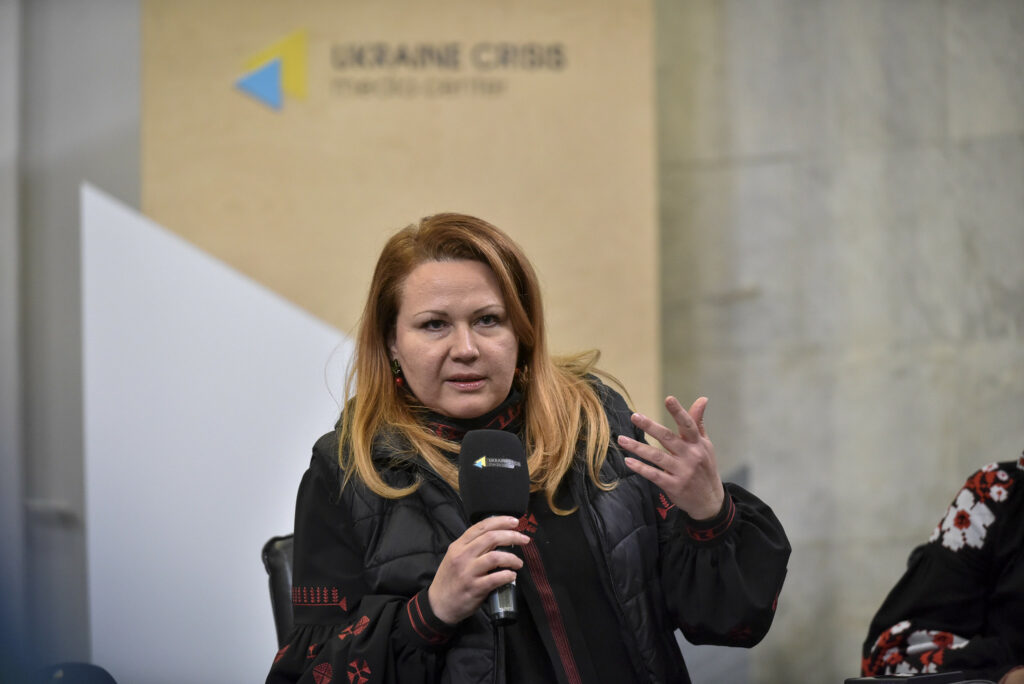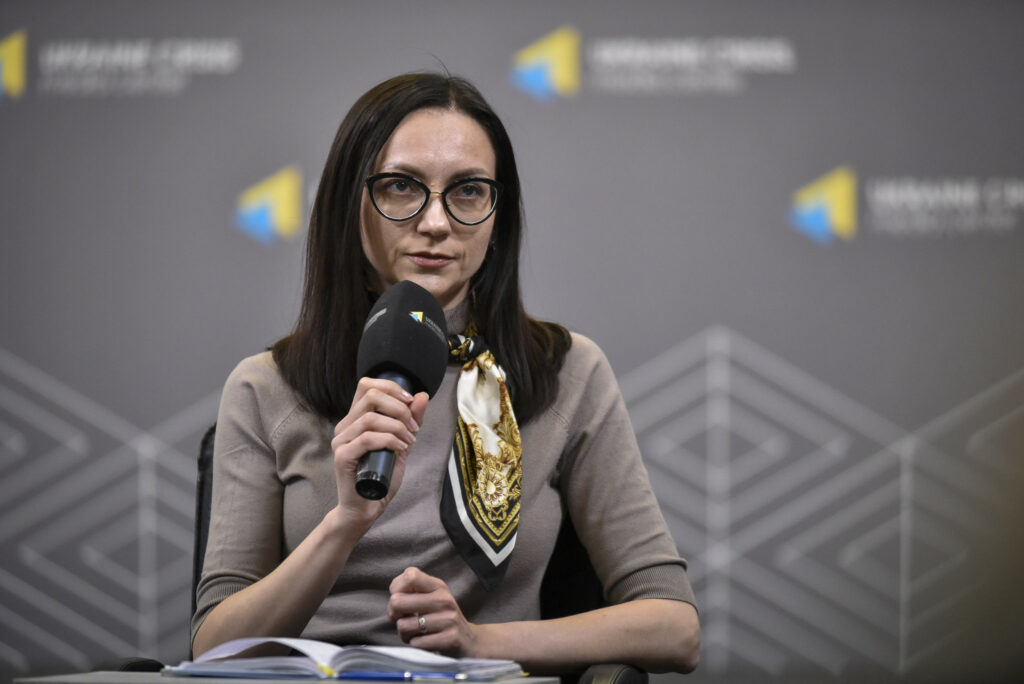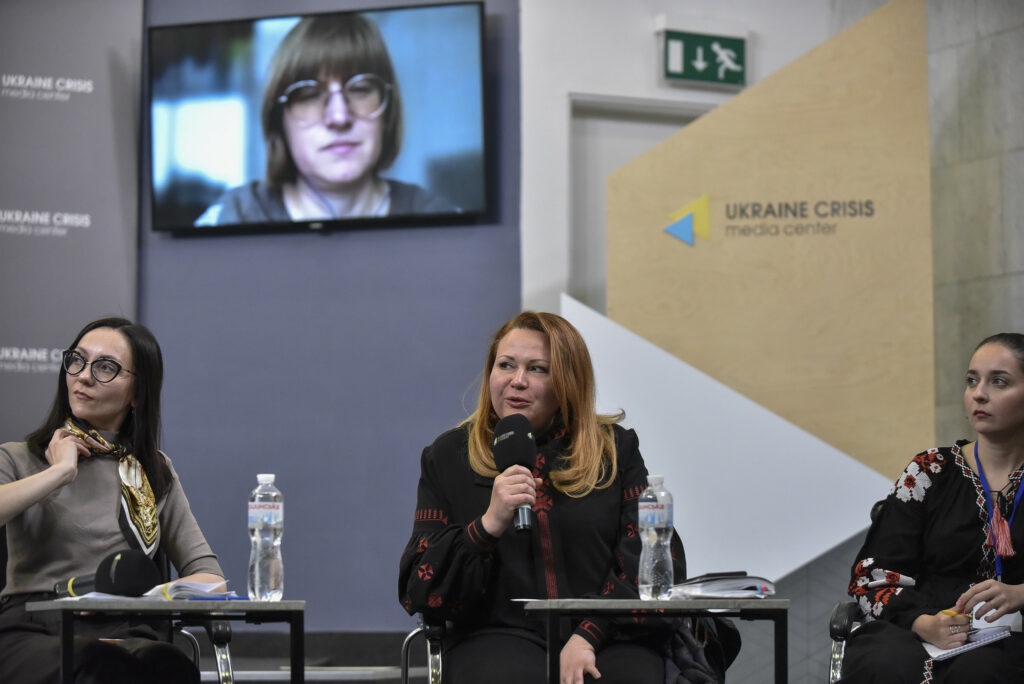A panel discussion “Ukraine in the EU is both our right and our responsibility” was held at the Ukraine Crisis Media Center as part of the project “Strengthening Information Resilience in Ukraine” with the support of the European Union.
Explaining the choice of the topic, Tetiana Kolosova, UCMC press center head, noted that European integration affects everyone in everyday life, but previously there was a lack of communication with society.
“There was no clarity on the list of questions to be answered and the scope of the homework to be done by us. And we began to integrate the European integration-related issues into public discussion topics that are understandable to everyone – from recycling and sorting of garbage to the development of small and medium-sized businesses and the quality of food products. Today, there is a need again to raise this wave of questions about European integration, because it appears that now this issue is reduced to receiving help from the European Union both during the war and after it, just as before it was reduced to visa-free travel,”, she told the participants of the event.
Liubov Akulenko, Liubov Akulenko, Executive Director of the Ukrainian Centre for European Policy, spoke about how Ukraine is progressing towards EU membership.
“We analyzed the Association Agreement only as of 2022. Why I am talking about the agreement is because now its implementation will be part of the negotiation process. The Agreement includes a list of legislative acts, by-laws and their implementation in practice. It also envisages the creation of certain institutions. We must show results at these four levels,” Liubov Akulenko stressed.
According to her, Ukraine is not moving towards complex systemic changes that are needed. For example, the creation of a high court on intellectual property issues, the reform of customs authorities, the trading of carbon dioxide emissions, the introduction of safety standards in road transport.
“What new awaits us? First of all, a very problematic cluster that our Government translates as fundamental areas. This includes all political reforms, anti-corruption and judiciary reform, the reforms of democratic institutions, law enforcement agencies, human rights, media reform, public procurement and statistics,” the Executive Director of the Ukrainian Centre for European Policy shared her expectations.
She compared the situation in Ukraine with the situation of the countries of the Western Balkans. The fact that the European Union, for its own convenience, tries to follow general formulations and general approaches, without taking into account the specifics of each country, can also add difficulties to the Ukrainian track. Unlike other clusters, this cluster is not provided with a list of legislation.
Natalia Pakhaichuk, head of innovative projects of the National Network of Hyperlocal Media Rayon.in.ua highlighted the experience of this project in European integration communication.
The Rayon.in.ua network has been covering this topic since 2017, and as it turned out, issues of European integration are of great interest to the audience and give perspective to this work. The main thing is to be able to see, interpret and present the topic correctly.
“Our network started in the Volyn region, where the visa-free issue was very urgent, and therefore it was was applied immediately. Now we work in eight regions of Ukraine. Our network includes more than 60 websites, and we cover not only information on local life, but also try to convey some more important things to each village where we cover news,” added Natalia Pakhaichuk.
Today, of course, the war came to the fore, relegating European integration to the background. However, high interest in it remains. It is increasingly seen as a historical process that will have consequences for decades and centuries for future generations. The editors undertook to cover this topic precisely in the manifestations of these changes at the household level. In addition, materials about how entrepreneurs find trade opportunities in the European Union are always very popular.
“European integration is very multifaceted, diverse, and not everyone knows that a lot of opportunities are opening up in the educational sphere, in the possibilities of public diplomacy. For some, visa-free means going to earn money during the strawberry season, and for some it is an opportunity for cultural exchange, grant opportunities, – noted the Head of Innovative Projects of the National Network of Hyperlocal Media Rayon.in.ua. – In my opinion, as journalists, as media, we greatly underestimate this topic, we do not make enough efforts to cover it properly. Maybe because the journalists themselves don’t always know such complex topics. To be able to cover them, you need to study a lot, but there are very few educational programs.”





